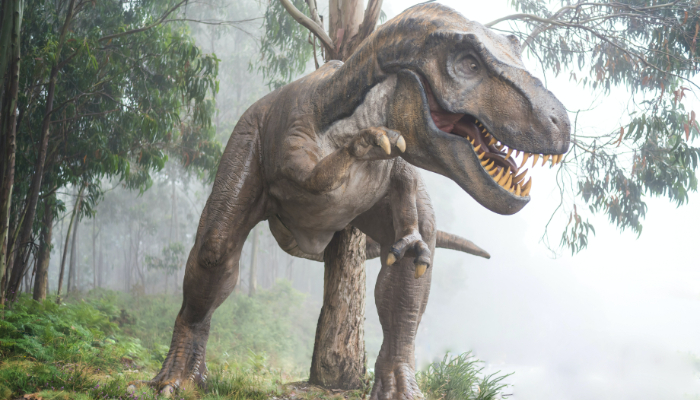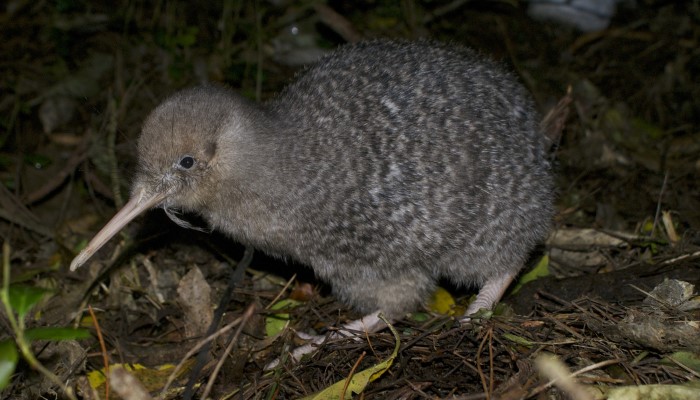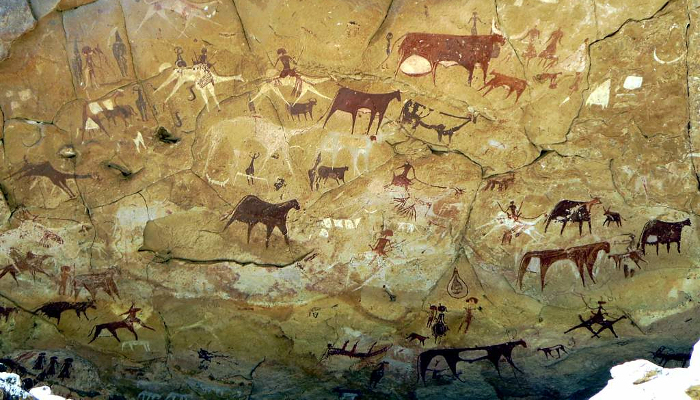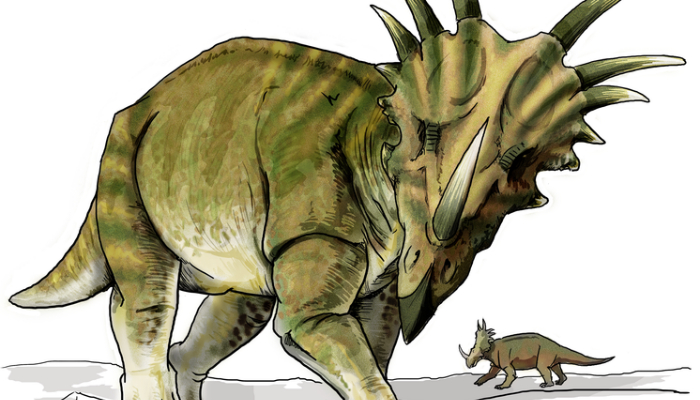Dinosaurs
Where can I find information about dinosaurs?
(Years 5-8)

Image: Tiranosaurus Rex by Fausto Garcia on Unsplash
Entry last updated: 10/07/25
Introduction
Dinosaurs are extinct reptiles that lived on Earth during the Mesozoic era that occurred between 251–65 million years ago. Dinosaurs came in all shapes and sizes, and we know about them because dinosaur scientists, called paleontologists, study their fossils.
Dinosaurs and definitions
Dinosaurs lived on Earth during what is called the Mesozoic era (which is Greek for 'Middle Life') of the world’s history. Different dinosaurs lived in each of the different time periods.
Triassic: 251–200 million years ago
Jurassic: 200–145 million years ago
Cretaceous: 145–65 million years ago
Carnivore: an animal that eats other animals, a meat eater.
Herbivore: an animal that only eats plants.
Omnivore: an animal that eats both plants and meat.
Piscivore: a type of carnivore that eats only fish.
Ankylosaurus: A herbivorous, armoured dinosaur that lived during the late cretaceous period.
Apatosaurus (Brontosaurus): A herbivore, one of the biggest animals ever, and could grow up to 23 meters long. It lived during the Jurassic Period.
Stegosaurus: A herbivore that had large plates along its spine. It lived in the late Jurassic Period.
Spinosaurus: A carnivore or a piscivore, scientists aren't sure. It lived during the late Cretaceous period.
Triceratops: A herbivore with three horns on its head. It lived during the Cretaceous Period.
Tyrannosaurus rex (T-Rex): One of the most famous dinosaurs because of its huge size. It was a carnivorous dinosaur that lived during the late Cretaceous Period.
Velociraptor: A carnivore that lived during the late Cretaceous Period.
General websites
The websites listed here will help you find out more about the various types of dinosaurs, when they lived, what they ate, and why they became extinct.
Britannica School is part of the EPIC databases which is a collection of reliable databases covering lots of different topics. It’s put together especially for New Zealand school students and helps to answer questions like this.
Choose Primary to begin with and enter the search word 'dinosaur'.
Read the articles dinosaur (extinct reptile) to understand when and where dinosaurs lived, their behaviour, and why they are not alive anymore.
If you scroll down the page of results, you will find links to many types of dinosaurs such as tyrannosaurus rex, brachiosaurus, diplodocus, and more.
You can always move up a reading level by going to Article Reading Level at the top of the page and selecting 2.
Tips: To get to the EPIC resources you will need a password from your school librarian first. Or you can chat with one of our AnyQuestions librarians and they will help you online. Some EPIC databases may also be available through your public library.
Fact Monster is an online encyclopedia and homework site. It has lots of basic facts and is a good starting point for all sorts of questions. If you scroll down to the bottom of the site, you will see it’s run by Pearson Education, a publisher of educational books.
To find information on this website, enter the keyword 'dinosaurs' into the search at the top.
This will take you to the main Dinosaurs page which has heaps of links to more specific information like the classification of Dinosaurs and dinosaur discoveries made in recent years.
Tips: Some websites have advertisements (or ads) which ask us to buy something or tell us to ‘click here’. It’s best to ignore these ads and focus on the information we’re looking for.
New Zealand sites
Fossils found in New Zealand tell us that dinosaurs once lived in New Zealand. Explore the sites below to know more about their history in our country.
Te Ara: The Encyclopedia of New Zealand
Te Ara is an excellent starting point for all questions about Aotearoa New Zealand. If we look down to the bottom of the page, we can see that the website belongs to the Ministry for Culture & Heritage, so the information is well-researched and reliable.
To find information about what fossils have been found in New Zealand, including dinosaur fossils:
Search for 'dinosaurs'.
Choose Age of the dinosaurs – Mesozoic to read which types of dinosaurs were found in New Zealand.
You will also find other stores related to Terrestrial fossils (remains of plants and animals that lived on land including dinosaurs) and Tuatara.
This website was put together by the University of Waikato and Curious Minds for school students. It contains a selection of articles, videos, and activities of science topics and concepts.
Enter the word 'dinosaur' into the search bar.
Read the article World’s largest known dinosaurs once roamed New Zealand or watch the video How old is that dinosaur?
Tips: Websites that have .org or .net in the address can have good information, but you need to assess how reliable it is. Check the About us link on the website, if you can find one. That can tell you what the organisation’s mission and values are.
Books
There are heaps of books about dinosaurs, including books specifically about some of the more well known dinosaurs. Here are some general books to start with:
Dinosaurs: travel through millions of years to see the birth and death of the dinosaurs by Liz Gogerly and Rob Hunt
Dinosaurs discovered by Dean R Lomax
Feathered dinosaurs by Brenda Z Guiberson
Monster dinosaurs by Claire Llewellyn.
If you are looking for specific books about a certain kind of dinosaur, try asking your school librarian or local librarian to help you find these.
SCIS no: 1987126
Topics covered
Related content

Animals (New Zealand)
Where can I find information about animals in New Zealand?

History (World)
Where can I find information about world history?

Animals
Where can I find information about different animals?

Stone Age
Where can I find information about the Stone Age?

Dinosaurs (junior)
Where can I find information about dinosaurs?
